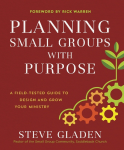Accelerate the health & growth of your small group ministry by attending one of these “Accelerate” Small Group Workshops!
Over the years we have been asked for guidance about starting, leading, and sustaining a healthy small group ministry. Trust me when I tell you, we haven’t always done it right, nor have we figured it all out. Together our ministry team came up with these commitments to keep us on target. These aren’t just for me as the small group point person; I make sure they serve to guide all leaders throughout our ministry. Once you’ve chosen the commitments that will guide your ministry, make sure your whole small group ministry team knows and owns them.
#1. I Will Move Slowly.
One of the worst things you can do is read a book or attend a conference and try to immediately implement all that you’ve learned. Quick action often risks triggering land mines. Don’t assume you know your ministry environment until you’ve listened carefully to its stakeholders. Change requires time, especially in a church environment. Before you take a step, pray! Then pause and listen for God’s direction. This direction could come from multiple sources, including your quiet time, friends, people in your ministry, church leaders, and elsewhere.
“Only simpletons believe everything they’re told! The prudent carefully consider their steps. The wise are cautious and avoid danger; fools plunge ahead with reckless confidence.” -Proverbs 14:15–16 NLT
#2. I will regularly check my motives and evaluate my heart.
Does your ministry come from a pure motive, or are you climbing the ministry ladder and merely checking things off your to-do list? Are you serving God or feeding your ego? Do you feel compassion toward those you are serving, or are they simply interruptions in your day? Your motivation must be God-centered, and you need to fully rely on him.
“I am the Good Shepherd. The Good Shepherd puts the sheep before himself, sacrifices himself if necessary. A hired man is not a real shepherd. The sheep mean nothing to him. He sees a wolf come and runs for it, leaving the sheep to be ravaged and scattered by the wolf. He’s only in it for the money. The sheep don’t matter to him.” – John 10:11–13 MSG
#3. I will steer clear of the numbers game.
It does not matter how many groups you have or the size of your church. Never evaluate based solely on numbers, but also on the health of each group and the ministry as a whole. God uses every church, regardless of size, to bring people to his Son, Jesus. Of course you must keep records to help you track progress and plan next steps, but avoid using numbers for bragging rights. Pay more attention to the measurable health of your groups. Evaluate by health, not just numbers!
“If a man has a hundred sheep and one of them wanders away, what will he do? Won’t he leave the ninety-nine others on the hills and go out to search for the one that is lost?” -Matthew 18:12 NLT
#4. I will not criticize the past.
Regardless of the current status of your small group ministry, it is an indication of the foundation that was likely built by someone else. Honor that foundation, regardless of your own personal opinions. Your role is to build on the foundation, not destroy it. Never criticize the past. Your character is revealed when you honor predecessors: “God used them for his purpose.” Also, I believe that history provides a plethora of learning opportunities. Examine the past, pick out the pearls, and learn from what didn’t work out as planned.
“Every teacher… is like the owner of a house who brings out of his store-room new treasures as well as old.” – Matthew 13:52
#5. I will avoid the comparison trap.
It is human nature to compare ourselves to others, and unfortunately the church is not immune to this. It is sinful to feel superior to another church or ministry, which is pride. Comparison can also make you feel discouraged, which can result in envy. Neither outcome is productive or helpful, and both will end up damaging your ministry. God created a unique fingerprint for each church and ministry, so learn from others but let your ministry be the healthy, unique version God intends.
“Pay careful attention to your own work, for then you will get the satisfaction of a job well done, and you won’t need to compare yourself to anyone else.” – Galatians 6:4 NLT
#6. I will focus on priorities and exercise a faith worth imitating.
The Lord is clear about our priorities. Never lose sight of love for God and for people as you work to create and grow your ministry. Taking action on your priorities takes faith and dependence on God to do great things. Ask yourself if you have a faith worth imitating. If someone was handed your spiritual life for seventy-two hours, afterward would that person desire to hang on to your faith or prefer to give it back?
“You must love the Lord your God with all your heart, all your soul, and all your mind.” This is the first and greatest commandment. A second is equally important: “Love your neighbor as yourself.” The entire law and all the demands of the prophets are based on these two commandments.” – Matthew 22:37–40 NLT
#7. I will pace myself.
It is possible to do ministry at such a pace that your work for God can destroy the work of God. We need to keep the long game in view, not just quick results. We can get so caught up in daily demands that we forget the habits that ensure endurance. Don’t be person who says, “I didn’t have time to pray today because I was late for a prayer meeting.” Religious activity can easily replace spiritual intimacy.
“Let us not become weary in doing good, for at the proper time we will reap a harvest if we do not give up.” – Galatians 6:9
#8. I will serve.
The most important part of leadership is a servant’s heart. This is countercultural, but Jesus was countercultural. And isn’t our goal to be Christlike? No job is too big or too small when setting up and maintaining your ministry. Lead by example and serve those around you, “just as the Son of Man did not come to be served, but to serve.”
“Whoever wants to become great among you must be your servant, and whoever wants to be first must be your slave—just as the Son of Man did not come to be served, but to serve, and to give his life as a ransom for many.” – Matthew 20:26–28
#9. I will be a learner.
I am a firm believer in the acquisition of knowledge. Your first resource must be the Word of God, chock-full of wisdom crucial to building a God-honoring ministry. I also believe you can learn from everyone—either what to do or what not to do. Seek counsel from those who have gone before you; ask questions of those around you; read books or attend conferences that relate to your ministry.
“Walk with the wise and become wise; Associate with fools and get in trouble.” – Proverbs 13:20 NLT
#10. I will stay focused and never give up.
You are never a failure until you give up, and it’s always too soon to quit. Regardless of your position in the church, commit to helping people connect in relationships and grow spiritually healthy. I’ve endured many days and seasons of frustration when nothing seemed in harmony. I couldn’t afford to dwell on the frustrating moments, or I would have become a frustrated person. I had to learn that trials teach lessons, and then I could focus on contentment even in the midst of trouble.
“Let us strip off every weight that slows us down, especially the sin that so easily trips us up. And let us run with endurance the race God has set before us.” – Hebrews 12:1 NLT
 To develop a strategic plan for your small group ministry, read my new book, “Planning Small Groups With Purpose.” Find it HERE
To develop a strategic plan for your small group ministry, read my new book, “Planning Small Groups With Purpose.” Find it HERE




 To develop a strategic plan for your small group ministry, read my new book, “Planning Small Groups With Purpose.” Find it
To develop a strategic plan for your small group ministry, read my new book, “Planning Small Groups With Purpose.” Find it 

